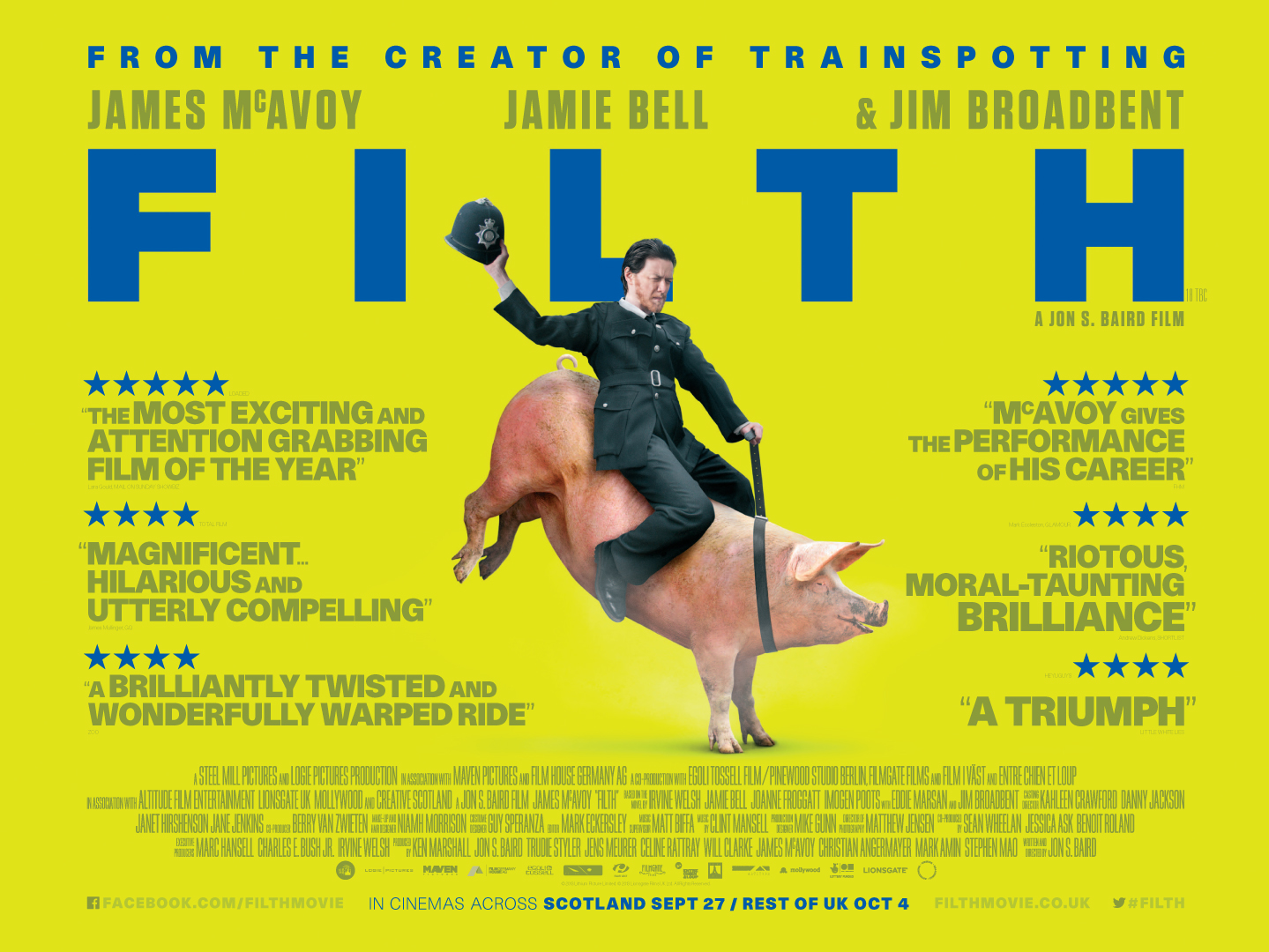Screenwriter: John S. Baid
Stars: James McAvoy, Jamie Bell, Eddie Marsan, Jim Broardbent
Trailer link
IMDb page
A filthy introduction:
John S. Baid's "Filth" is dirty, wretched and out of control right from the get-go. It initially reminded me a lot of Scorsese's "The Wolf of Wall Street", but as it moved into its second hour, I found myself much more engaged in the story than I ever was during "Wolf", the main reason being that this film actually has a sense of self awareness and some interesting characters. The movie is an adaptation of Irvine Welch's novel of the same name, and it stars James McAvoy in the leading role as a twisted, drunken, vile and corrupt Edinburgh cop by the name of Bruce Robertson, who has made it his personal goal in life to be as big of an ass to everyone around him as humanly possible.
The darkest comedy of 2013:
This film is dark. Not just traditionally dark à la "Fargo", "In Bruges" or "American Beauty", but dark as in "American Psycho" with a twist of "Se7en" and a smidgen of "No Country For Old Men". In other words, do not go into this film expecting it to be light and entertaining, because even though it truly is funny, it also contains some of the most brooding, depressing and jaw dropping scenes I have seen in quite a while. The film is not gory or frightening in traditional horror movie fashion, but chocking and disturbing in a twisted "Requiem for a Dream"/"Trainspotting" heroin junkie kind of way. And yes, in case of Filth, that actually is a good thing.
Hugely stylised, but not just smoke and mirrors:
The thing that I did not like about The Wolf of Wall Street was the way in which it acted as if it had a lot to say, without actually saying anything worth remembering. Scorsese spent three hours trying to make his audience interested in Leonardo DiCaprio's character and failed miserably, and even though James McAvoy's character has a lot in common with Leo's, Filth is a much richer movie in terms of depth, thematic value and pure entertainment, because of the way in which it acknowledges what kind of genre it fits into, and sticks to those roots throughout the film. Sure, the actual story is barely better than mediocre and does hit a few fairly substantial rough patches, but given its blatantly grotesque and warped nature, the film as a whole does not suffer that much because of it. John S. Baid knew his possibilities and limits when he set out to adapt Irvine Welch's novel, and his efforts payed off in my opinion.
James McAmazing:
Bruce Robertson is in almost every scene in this film, and James McAvoy does an immaculate job of portraying the character and his filthy lifestyle, delivering what I believe to be the pest performance of his young career. Robertson is a very physical and in-your-face type of person, and McAvoy portrays this aspect of his character in a very controlled and confident but also outrageous and explosive manner, which really emphasized his repulsively vulgar and bipolar personality. There is no denying the fact that Bruce is a filthy and disgusting person with no sense of compassion or empathy whatsoever, but his disturbing behaviour and complete disregard of everything decent and morally acceptable is still very interesting to behold. Thanks to a top notch performance and some truly great writing, the character of Bruce Robertson is the single most positively appalling characters put on screen in 2013, and the fact that DiCaprio got nominated for the Oscar over McAvoy makes me both sad and disappointed.
The verdict:
Despite its average story and slightly unbelievable premise, John S. Baid's Filth is one of the most original movies I have seen in a long long time, as well as one of the funniest and most chocking movies of 2013. I am currently catching up on as many of the most interesting movies from last year as I can, in order come up with as believable a top 10 list of last year's movies as possible, and I would not be surprised if Filth makes that list. It is a grotesque piece of work that is likely to offend a whole bunch people, but in my opinion, this bombastic nature is the thing that makes the film as engaging and entertaining as it is. Those of you who liked The Wolf of Wall Street should go out and watch Filth right away, because in between those two thematically similar films, I think the latter is the better movie by far.



